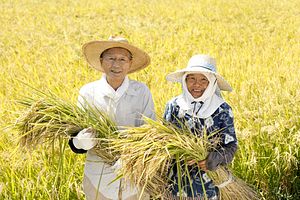An article in the Yomiuri Shimbun highlighting several new joint ventures between agricultural cooperatives and Japanese businesses directly points at several problems with, and possible solutions to, Japan’s agricultural industry. More than any other sector in Japan, farmers and fishers will feel the effects of Japan’s eventual population decline first, as most people who work in these industries are already advanced in age. Additionally, Japanese agricultural is notoriously inefficient, lacking economies of scale due to the small size of mostly family-run holdings.
In the prefecture of Chiba just next to Tokyo, farming is in decline as farmers age and the number of abandoned plots increases. A new subsidiary of Sojitz Corp. called My Vegetable Corp, has begun large-scale cultivation of greenhouse vegetables, operating on 10,000 square meters of land that is expected to grow to 30,000 meters in three years. Once My Vegetable is able to develop its sales, it expects to have 200,000 square meters of “convenience store-style farms” across Japan in 10 years. Aside from achieving scale production that would reduce the number of farmers needed, the cultivation beds are raised 80 cm off the ground, enabling older farmers to work without extensive bending and lifting.
In the fishing industry, meanwhile, a Mitsubishi Corp. affiliate called Toyo Reizo Co., is farming blue fin tuna. With three farms producing 300 tons of fish in fiscal 2014, it has already increase production by a factor of ten since fiscal 2013. Toyo is also working with Nagasaki Takashima Fisheries Center, jointly funded by the public and private sectors, which incubates eggs that Toyo later raises. The farm on Goto Island also employs fisherman from the local cooperative, who feed the tuna the smaller fish from their catches. The adult tuna are raised for three years and reach 30 kg or more.
Enterprises like this between large Japanese companies and agricultural cooperatives are what Prime Minister Shinzo Abe is trying to establish on a much larger scale, as both the area of land cultivated in Japan and the number of workers has declined significantly, with the ratio of those over 65 reaching 57.4 percent in 2005. Large-scale production would make the sector more competitive in general, and thus less vulnerable to competition in trade deals like the proposed TPP. In June the LDP announced it wanted non-food companies to be able to increase their share in agricultural companies from 25 to 50 percent. However, JA-Zenchu, which represents most agricultural cooperatives, largely opposes such reform. Although the government has proposed removing JA’s ability to manage regional cooperatives, this is likely to be a difficult, long-term process, as JA and its cooperatives form a significant portion of the LDP’s political base.
Interestingly, many of these ventures are looking to market their products not only domestically but also overseas, anticipating potential demand for Japan’s food products, which are perceived as healthier and safer (particularly in China). Significant agricultural reform is unlikely as Japan’s participation in TPP negotiations flounders. Nonetheless, continued progress on partnerships between cooperatives and Japan’s large corporations will eventually make the agricultural sector more efficient, an imperative for the nation as its farming population shrinks.

































